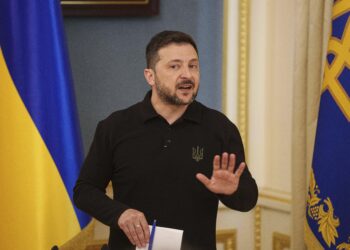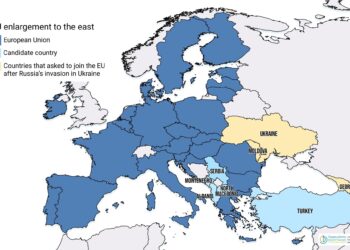In recent years, the intersection of child protection and freedom of expression has emerged as a pivotal battleground in the European Union, especially in Hungary. The legal clash between the Hungarian government and the Court of justice of the EU has intensified over controversial legislation that critics argue constitutes censorship under the guise of safeguarding children. As Hungary implements measures aimed at restricting access to LGBTQ+ content and discussions in schools, the EU’s highest court is grappling with the implications of these laws on fundamental rights and freedoms. This article delves into the complexities of the ongoing legal struggle, exploring the arguments on both sides and the broader implications for EU member states striving to balance societal values with the protection of individual liberties.
Child Protection versus Censorship: Understanding the Legal Context in Hungary
The ongoing legal contention between Hungary and the Court of Justice of the EU revolves around the delicate balance between protecting children and restricting free expression. Critics argue that recent legislation in Hungary, designed ostensibly to safeguard minors from harmful content, veils a larger agenda of censorship that disproportionately targets LGBTQ+ communities. This has raised significant concerns across various human rights organizations, prompting allegations that the government is prioritizing ideological conformity over individual freedoms and the broader understanding of diversity.
To better grasp the implications of this legal standoff, it’s crucial to consider the following aspects:
- Definition of Child Protection: Measures aimed at shielding children from exposure to inappropriate materials.
- Scope of Censorship: Policies that limit access to information based on subjective moral standards.
- Impact on Freedom of Expression: Potential suppression of voices that challenge state narratives.
- Legal Precedents: previous rulings that inform the current situation and their implications on European law.
Moreover, the interplay between national sovereignty and EU regulations has profound consequences. The following table illustrates some key aspects of the ongoing debate:
| aspect | Hungary’s Position | EU’s Position |
|---|---|---|
| Child protection Laws | Strict regulations claiming to safeguard minors | Emphasis on preventing discrimination and promoting inclusion |
| Censorship Concerns | Defends policies as necessary for societal norms | views legislation as a potential violation of freedoms |
| International Responses | Support from conservative groups | Condemnation from human rights organizations |

The Role of the Court of Justice of the EU in Upholding Fundamental Rights
The Court of Justice of the EU (CJEU) plays a pivotal role in ensuring that the fundamental rights enshrined in European Union treaties are upheld across member states. In the case of Hungary, the court has intervened to assess the legality of laws that potentially infringe on children’s rights, particularly in contexts affecting their access to information and freedom of expression. This is paramount in instances where legislation appears to prioritize certain societal values over the fundamental protections granted to children. The CJEU’s judgments serve not only as remedies for individual cases but also as guiding principles that shape the legal standards for the protection of fundamental rights throughout the EU.
Through a rigorous judicial process, the Court emphasizes the importance of non-discrimination, freedom of association, and freedom of expression, standing firm against measures perceived as censorship disguised as child protection. The implications of the CJEU’s rulings resonate broadly, often leading to adjustments in national policies and legislation that seek to reinforce adherence to European standards. The ongoing legal battles signify a complex intersection of cultural norms and legal frameworks, where the CJEU acts as a guardian of fundamental rights, working to ensure that the protection of children aligns with the overarching commitments to human dignity and autonomy.
| Aspect | CJEU Role | Hungary’s Approach |
|---|---|---|
| Protection of Children’s Rights | Upholds EU standards | Potential censorship issues |
| Freedom of Expression | Defends against restrictions | Legislation prioritizing certain values |
| Judicial Review | Checks compliance with EU treaties | Legal challenges to CJEU rulings |

Key Implications of Hungarys Legislation on LGBTQ+ Communities
The recent legislation in Hungary has sparked a significant debate regarding its impacts on LGBTQ+ communities, raising concerns beyond national borders. Proponents of the law argue it serves as a protective measure for children, yet critics assert that it restricts the fundamental rights of individuals based on sexual orientation and gender identity. This dichotomy highlights a deeper ideological divide within the European Union, with Hungary’s stance perceived as a step back from inclusive policies that protect against discrimination. Key implications of this legislation include:
- Reduction in Visibility: LGBTQ+ individuals may face increased marginalization as public discourse becomes limited, effectively erasing their presence in educational and cultural contexts.
- potential for Legal Challenges: This law could pave the way for extensive legal battles both domestically and at the European level, as advocates seek to overturn or challenge legislative measures that infringe upon human rights.
- Impact on EU Relations: The ongoing conflict between hungary’s policies and EU regulations could lead to strained diplomatic relations, as the EU considers repercussions for member states that violate fundamental principles of equality.
Moreover, various organizations and activists are concerned about the chilling effect this legislation could have on free expression, especially among educators, artists, and activists. By framing discussions around LGBTQ+ issues as a threat to children, the Hungarian government not only stifles needed conversations but also creates an environment of fear amongst those who may wish to promote acceptance and inclusion. This atmosphere could lead to:
- Self-Censorship: Individuals and institutions may refrain from engaging in dialog or advocacy for LGBTQ+ rights, fearing backlash or legal consequences.
- Decreased Mental Health Support: The stigma and discrimination perpetuated by these laws can exacerbate mental health issues within the LGBTQ+ community, limiting access to necessary resources.
- Global Activism: Increased international scrutiny and solidarity efforts as activists unite across borders to combat similar legislation in other countries.
Analyzing the Reactions from EU Member States and International Organizations
The legal proceedings surrounding Hungary’s controversial child protection law have elicited a plethora of responses from EU member states and international organizations. Many nations within the EU have expressed concern over the implications of this law, viewing it as a potential infringement on fundamental rights. Countries such as Germany and France have voiced strong support for the Court of Justice of the EU’s (CJEU) stance, emphasizing the necessity of maintaining a balance between protecting vulnerable populations and safeguarding civil liberties. The reactions have not been uniform; some member states remain divided, illustrating the complexities of legislating on a matter that touches both national sovereignty and EU principles.
International organizations have also weighed in on the debate, underscoring the global ramifications of Hungary’s legislation.For instance, bodies like the United Nations and Amnesty International have condemned the law, framing it as an erosion of democratic standards and a form of censorship that could harm marginalized communities. These organizations urge the EU to take a firmer stand against Hungary, advocating for both legal and diplomatic measures to uphold the principles of human rights and equality across member states. The discourse has sparked wider discussions about the limits of national legislation in contexts that have substantial implications for human rights protection across europe.

Future legal Developments: What to Expect in the Ongoing Dispute
As the legal battle between the Court of Justice of the EU and Hungary unfolds, several key developments are anticipated in the coming months. Legal experts predict that these proceedings will further illuminate the complex relationship between child protection policies and freedom of expression. Hungary’s stance has raised significant questions about the extent to which governments can regulate content under the guise of protecting minors. Stakeholders from various sectors, particularly those involved in media and education, are likely to closely monitor the Court’s upcoming rulings, which may set important precedents for how child protection measures are implemented across the EU.
Furthermore, potential outcomes may prompt discussions regarding the balance between national sovereignty and EU law. The following factors are expected to play a crucial role in shaping future legal discourse:
- Legal Precedents: past rulings from the CJEU that challenge national legislation.
- Public Opinion: The influence of social sentiment towards child protection versus perceived censorship.
- Advocacy Responses: How NGOs and civil liberties groups will mobilize regarding the issue.
| Potential Outcomes | Implications |
|---|---|
| Strengthening Child Protection Laws | Enhanced EU alignment on content regulation. |
| Heightened Scrutiny on Hungarian Legislation | Possibility of infringement procedures leading to sanctions. |
| Broader EU Legislative Reforms | Standardizing child protection across member states. |

Recommendations for Balancing Child Protection and Freedom of Expression
Striking a harmony between safeguarding children and preserving freedom of expression necessitates a nuanced approach. The following strategies can mitigate the risks of overreach while still providing necessary protections:
- Clear legal definitions: Establish complete and specific laws that delineate what constitutes harmful content for children, avoiding vague terms that might lead to broad censorship.
- Age-appropriate content assessment: implement robust systems that classify content based on its suitability for different age groups, empowering parents and guardians to make informed decisions.
- Inclusive dialogue: Foster conversations among stakeholders, including children, parents, educators, and policymakers, to better understand the implications of both child protection laws and freedom of expression.
- Enhanced digital literacy: Promote programs that educate children about navigating online spaces safely, ensuring they can discern between appropriate and inappropriate content.
- Clarity in enforcement: Enforce child protection laws with transparent methodologies to ensure accountability and reduce potential overreach by authorities.
Along with the strategies listed above, consideration of international best practices can bolster efforts to maintain this balance.Countries can benefit from sharing experiences and solutions through the following approaches:
| Country | Approach |
|---|---|
| Sweden | Community-based guidelines involving parents in content rating systems. |
| Germany | Mandatory digital literacy programs in schools to empower children. |
| Canada | Active collaboration between tech companies and governmental bodies to monitor online content. |
By drawing upon these frameworks, nations can work together towards a balanced approach that prioritizes child safety while respecting the fundamental rights of freedom of expression, ultimately fostering a safer yet open digital environment for all.

The Conclusion
the ongoing legal confrontation between the Court of Justice of the European Union and Hungary raises pressing questions about the balance between child protection and freedom of expression. As the EU intensifies its scrutiny over Hungary’s controversial legislation, the outcome of this case could set significant precedents for the interpretation of human rights within the bloc. This clash not only reflects the broader tensions over governance and rule of law in Europe but also underscores the complex challenges that arise in safeguarding vulnerable populations while ensuring robust democratic principles. As both sides prepare for further legal proceedings, the implications of this case will likely resonate throughout the european Union, influencing both policy and public discourse on human rights protection in the digital age. The road ahead remains fraught with uncertainty, but it is clear that the stakes could not be higher for the future of free expression and child safety across Europe.












